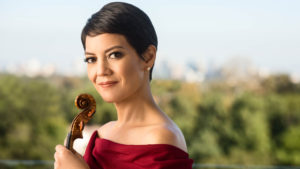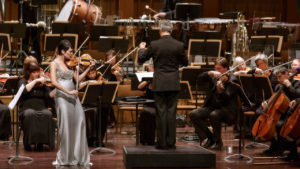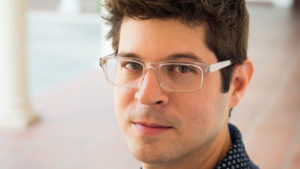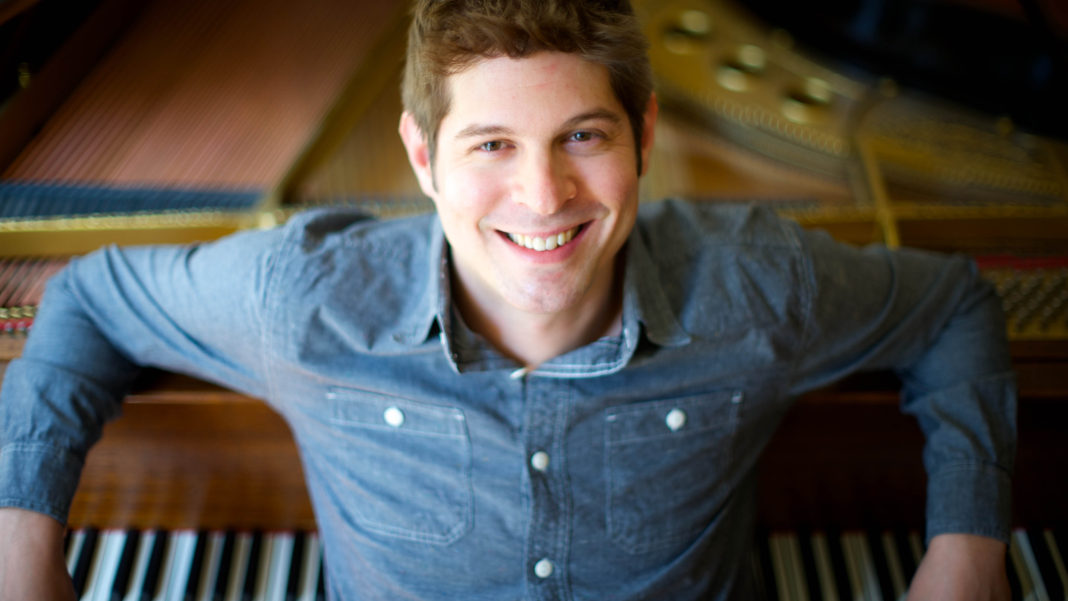Composer Adam Schoenberg disproves the notion that those who can’t do teach. Yes, he teaches at Occidental College in Los Angeles, but he’s also one of the most performed living classical composers. And local audiences get a chance to hear his music when the Pasadena Symphony, under the baton of David Lockington, will perform Schoenberg’s Orchard in Fog. The performances take place on Saturday, May 4th (there’s both a matinee and an evening performance.)
Orchard in Fog, a concerto for violin and orchestra, was written specifically for violinist Anne Akiko Meyers (who will perform the piece this weekend.) Schoenberg’s composition had its world premiere in February 2018 in San Diego. Also on the program are Beethoven’s 5th Symphony and Verdi’s Overture to La Forza del Destino.
When I recently spoke with Schoenberg, we discussed Meyers, the piece itself and the future of classical music, from his perspective of being both a composer and a teacher.
Orchard in Fog premiered last year. Anne Akiko Meyers said that she has gone through the piece very slowly “looking for clues” to find the storyline. How important is it for the composer and the soloist to communicate about the storyline within a given work?

I think it entirely depends on the collaboration and how it initially came about. In this particular case we had worked together before. After that initial project she came back and asked for a violin concerto solely for her. That became very specific. The narrative I came up with and shared with her later. I kept Anne in the dark for a lot of it. It was such an intimate and personal work, I needed to grapple with the narrative that was evolving.
You’ve talked about the story being about an “aging man visiting the orchard where he was once married many years ago.” Have you made any changes to the piece since its premiere in San Diego?
They are super super minor. My wife is now predominantly a television writer, but we met at the MacDowell Colony in New Hampshire and when we first met she was a playwright exclusively. We talked about bringing new work to life. The theatre has it right. You write the first draft of a play, then have a table read and you re-work it. Then you have a staged reading and make other revisions. And then you mount it in some capacity.
For an orchestral composer, 99% of the time, you have the commission and the first performance, just like we did in San Diego. I drove down on Monday. We rehearsed for a few days and then it gets performed. I can only make changes in the hotel room overnight. Then it’s over with. Then you can process what happened and make more changes. After [the performance in] Phoenix, I have not made more revisions. This is the first piece of mine that, start-to-finish, I think makes sense.
When you are writing specifically for a particular instrumentalist, how much do you keep in mind their strengths and/or weaknesses and how does that influence the music you write?
That was definitely on my mind. It’s a very unusual concerto. Typical concerti have a first flashy movement, a lyrical second movement and then a fast finale. Anne is such a deep and profound musician, I think her slow and lyrical playing is one of her strengths. When she adjusts her vibrato in any capacity you feel that emotional power that she has. I definitely wanted to write a piece that fell on the slower, more lyrical side. The first movement is meditative and reflective. It’s 11 minutes of slow music where I’m featuring how she can play with so much feeling. It is slow-fast-slow.
What is it about Meyers that inspires you?

She’s an extraordinary musician. I think what’s going to be part of her legacy, and one of the most important facets, is how many other world-famous artists are not personally commissioning composers to extend the repertoire for their instrument. This is part of her mission. I’m beyond thankful and grateful that she loves the music of our time and wants to champion the composers of our time.
You teach music at Occidental College. What do you see, through your work with the students there, is going to be the future of classical music?
This is so clichéd, but I think it’s bright. We have our concerts next week.* Of our six composers, each piece could not be more different. But each one has their own voice and they are figuring out what they want to say. Music is continuing to evolve and continuing to speak to audiences. I don’t know where the future will take us, but I think technology will lead to new ways of expression.
How does that land in the concert setting? I am a traditionalist. I love the acoustic tenors of the orchestra. I think it would be interesting for concert halls to integrate speaker systems to weave in electronics and amplification and have it more streamlined where they are making music more dimensionally.
You enrich minds through both composition and teaching. What does being a teacher offer you that composition does not and vice-versa?

I had such incredible mentors at Juilliard. Teaching composition is equal parts philosophy and technical work. When you are a composer for orchestras, you are solitarily creating and working through the battle you go through with very decision you make. What I love about teaching is I can pass on this art form, but I also learn so much from my students. When they are grappling with an issue, I can open up three windows and say you can choose which path to take. As a composer, I get trapped the same way. Had I not been teaching, I wouldn’t have thought how to work out those obstacles. I’m also inspired by the ideas they are bringing in because I’m not hearing music that way. That all becomes part of the process.
*The concert took place on April 29th.
For tickets go here.
Main photo by Erik Rynearson/Courtesy of Adam Schoenberg












